- Home
- Tim Powers
The Anubis Gates Page 19
The Anubis Gates Read online
Page 19
Remembering Tay’s prediction that men would be sent ahead to descend into the sewers to intercept them, Jacky didn’t wait to arrive at one of the docks further down, but lowered herself into the water. It was cold, but as the subterranean river had slowed and diminished in width since her dip in it Saturday night, it had also lost its sharp chill. For a moment she clung to the raft.
“Rest in peace, Teobaldo,” she said, and then pushed off. Once she’d shucked the sodden Ahmed robe she had no difficulty in swimming against the current, and soon she had left the raft—and the torch—behind, and was swimming upstream in darkness. It wasn’t a threatening darkness, though, and Jacky knew instinctively that the deeper river, the one on which she’d “seen” the boat, had no connection with this channel—perhaps not even with the Thames.
Voices were echoing down the watercourse—”Who the hell did he say it was?”
“Old Dungy and that Hindoo.”
“Well, Pete’s lads will stop ‘em at the dock below Covent Garden.”—and yellow light glinted on the water and the wet walls and ceiling ahead of her. Then she rounded a curve, dog paddling silently, and could see, far ahead, the dock from which they’d embarked. There were several men on it, all carrying torches, though Horrabin didn’t seem to be present.
“They must be crazy,” commented one, his voice carrying clearly down the tunnel. “Or maybe they thought the Hindoo had better magic. It’ll be interesting to hear them—ow! Damn it, how did a bee get down here?”
“Jesus, there’s another one! Come on, there’s nothing to be done here. Let’s go upstairs and watch when they bring them in. It ought to be good—the clown ordered the hospital opened.”
The men hurried away, and the tunnel went dark; for a moment the archway glowed orange, and then as the torches were carried away up the hall it too faded into the uniform darkness. Jacky paddled steadily toward the after image in her eyes, being careful not to turn her head, even when she felt the false beard peel off and slide past her shoulder. After a few minutes she banged a hand against the timbers of the dock. She pulled herself up onto it and sat there, panting. She was naked except for a pair of shorts, and reaching up to brush her hair back she noticed that her moustache had pulled away with the beard.
This wasn’t, she reflected, the sort of costume in which she could slip unnoticed out of Rat’s Castle.
She padded timidly through the arch, wishing she still had the dagger. In the silence she could hear a bee buzzing somewhere. The long hallway was evidently empty, and she picked her way down it, pausing frequently to listen for pursuit from either direction, but especially from behind.
She climbed a set of stone steps to a wide landing, and in groping to find the next set of steps she brushed the wooden surface of a door. There was no faintest sliver of light visible around the frame or between the boards, so either the room beyond was as dark as the stairs or this was an unreasonably solid door.
She pressed the latch—it wasn’t locked!—and inched the door open. No light spilled out on the stairs, so she hurried inside and closed the door behind her.
She had no way to strike a light even if she’d dared to, so she reconnoitered the room by feel, following the wall around all four sides of the little room back to the door again, and then making a cautious diagonal across the middle of the floor. There was a narrow bed, neatly made, a dresser with a couple of books on it, a table on which Jacky’s gently groping hands felt a bottle and a cup—she sniffed the cup: sharp gin—and, in the corner, a chair on which were draped—and Jacky thanked God as she fumblingly identified the objects—a short dress, a wig, a make-up kit, and an ancient pair of ladies’ leather slippers.
It’s an absolute miracle that these clothes should be laid in my path, she thought. Then she remembered that old Teobaldo had said he’d been ordered to do a full-dress performance tonight—this must be his room, and he must have laid the costume out before, as he’d put it, deciding to die. Though she couldn’t see, she glanced curiously around the room, and wished she could know what the books on the dresser were.
* * *
Len Carrington sat down right in the front room and had a long sip from his pocket flask, not caring who might see him. Why was it, he’d have liked to know, that he was suddenly appointed the clown’s second in command, and simultaneously expected to mollify the angry Doctor Romany, evaluate the unsatisfactory reports being run back every few minutes from the team that was trying to catch the two fugitives, and assure the raging Horrabin—who was moaning in a hammock, evidently with bad burns all over himself—that every step was being taken to remedy the situation? Carrington didn’t even understand what the situation was. He’d heard that the dancing dwarf had tried to kill the clown and had then fled down the underground river with a Hindoo, for God’s sake, but if that was so, why was Doctor Romany only interested in talking to the Hindoo?
Someone was trotting up the stairs from the basement. Carrington considered, and then rejected, the idea of standing up.
It proved to be, of all things, a woman. Her hair looked like some sort of rodent’s nest and her dress fit her like a tarpaulin tied around a hatrack, but her face, under a lot of powder and rouge, was pretty. “They told me to look for Horrabin downstairs,” she said, as calmly as if a woman in Rat’s Castle was not as unprecedented a thing as a horse in Westminster Cathedral. “I didn’t see him.”
“No,” said Carrington, scrambling to his feet. “He’s… under the weather. What the devil are you doing here?”
“I’m from Katie Dunnigan, who runs all the accommodation houses around Piccadilly. I’m supposed to arrange a conference—evidently this Horrabin fellow wants to buy in.”
Carrington blinked. So far as he knew the clown had not branched out into prostitution, but it was certainly his sort of thing. And it was inconceivable that a young girl would come to this place without some such reason. He relaxed—she certainly had nothing to do with the two fugitives. “Well I’m afraid you can’t see him now. You’d better leave—and tell this Dunnigan woman to send a man next time! You’ll be lucky if you’re raped less than a dozen times before you get out of this building.”
“Loan me a knife, then.”
“Wha—why should I?”
Jacky winked. “You ever get out to Piccadilly?” A slow smile built on Carrington’s face, and he reached out and slipped an arm around her.
“No no, not me,” she said hastily. “I, uh, have—a disease. But we’ve got clean girls in Piccadilly. Shall I give you the password that’ll get you one gratis, or not?” Carrington had recoiled from her, but now grudgingly reached under his coat and pulled out a knife in a leather sheath. “Here,” he said. “What’s the password?”
Jacky said the filthiest compound noun she’d ever heard. “I know it sounds crazy, but that’s it. Just walk into any of those places, go up to the bouncer by the front door and whisper that to him.”
Jacky walked unhurriedly out of Rat’s Castle, ostentatiously cleaning her fingernails with the knife.
CHAPTER 7
“Youth, Nature, and relenting Jove
To keep my lamp in strongly strove,
But Romanelli was so stout
He beat all three—and blew it out.”
—Lord Byron, in a letter from Patras, October 3,1810
Doyle awakened on his straw pallet Saturday morning and realized that he’d come to a decision; the prospect of what he intended to do dried his mouth and set his hands trembling, but it was the clean jumpiness of a difficult course resolved upon, and it came as a relief after a week of murky indecision.
He realized now that it had been a mistake to pin all his hopes on the intervention of Ashbless. Even if he could find the poet, it was a fantasy to imagine that Ashbless would, or could, do anything to aid him. The conflict was between himself and Doctor Romany, and a confrontation was the only way to resolve it. The sooner it occurred, the better—for Doyle’s health was definitely declining.
He as
ked Kusiak for the day off, and the old man was happy to give it to him, as Doyle’s hacking cough was getting so bad that customers were uneasy around him, as though fearing he carried some plague. Doyle took the meager cash he’d saved and bought what he thought of as insurance: a battered and rusty old flintlock pistol which the marine store owner had insisted would actually fire, and with which Doyle would threaten to kill himself if Doctor Romany tried to have him seized. Yesterday on London Bridge Jacky had told him about the abortive attempt on Horrabin’s life, and Doyle wished he had the poison pill the dwarf had offered Jacky; it would be easier to carry that between his teeth than to lug around a pistol pointed at his head.
Realizing that his arm would get tired if he should have to keep the heavy pistol pointed at himself for very long, he had taken off his belt, run the end of it through the gun’s trigger guard, and then re-buckled it around his neck. With his coat buttoned up over it and his scarf fluffed out to cover the gun’s muzzle, which was now pressing coldly into the soft spot behind his chin, he avoided being conspicuous and also kept the pistol in a position where one yank of his thumb between the second and third buttons of his coat would send a pistol ball punching up through his mouth, palate, nasal cavity, brain, and then bursting out into the sunlight right aft of his widow’s peak.
In Bishopsgate Street he met a beggar from Captain Jack’s house, and after exchanging greetings the man told him that Doctor Romany’s gypsy camp was currently in a field up at the north end of Goswell Road, telling fortunes for aristocrats from the West End and selling love potions and poisons to the inhabitants of the Golden Lane rookery.
Doyle thanked him, asked to be remembered to the company, and turned east on London Wall Street. Just as he was crossing Coleman Street—only a block, he realized, from Keats’ birthplace—he heard a sharp whistle from the north side of the street.
It was the high-low-low first three notes of Yesterday.
And it was answered, from the opposite side of Coleman Street, by the up and down the scale next nine notes.
This time there was no doubt. He was not the only twentieth century man in 1810. His heart pounding, he sprinted across the street and then paused on the north pavement, looking wildly around. Many people were staring at him, and he looked earnestly into each amused or disapproving face, hoping to recognize somehow a fellow anachronism; but they all seemed to be indigenous citizens.
He’d taken a couple of uncertain steps up Coleman Street before noticing the coach at the opposite curb. Its side window was open and Doyle could dimly see a passenger within. In the instant before his feet were yanked off the pavement he saw the flash of a gun in the carriage, but what he heard was the detonation of the pistol under his shirt as the bullet shattered the flashpan and hammer and ignited the powder; he’d been turning quickly, and the muzzle was next to his jaw instead of under it when the gun went off, and the red-hot ball only plowed up the side of his face and ripped his right ear off, instead of exploding his head.
He lay crumpled, unaware of the rattle as the carriage moved off. He vaguely realized that there had been an explosion, and that he was hurt, and that there was blood all over him. His chest hurt terribly, but when his numb hands had brushed aside the powder-burned tatters of his shirt and knocked the smoking, splintered gun off to the side, there seemed to be no lethal injury—just a lot of burns and scratches. His ears were ringing, the right worse than the left; in fact, that whole side of his head was as dead as though he’d been given a shot of Novocain. He fumbled at it with his hand and felt hot, free-flowing blood, and ripped flesh, but no ear. What in God’s name had happened?
He had rolled over and was trying to get to his feet when several people came over and sympathetically but roughly dragged him upright. Doyle was dazedly aware of what they were saying:
“Are ye going to live, mate?”
“How can you ask, look, he’s shot right through the head.”
“The man in that carriage shot him.”
“Nonsense, I saw it all—his chest exploded. He was carrying a bomb. He’s one of the French spies from Leicester Square.”
“Why, look,” exclaimed one. “There’s a wrecked pistol tied around his neck.”
He tilted Doyle’s face up toward his own. “Why in hell were you carrying a pistol that way?”
Doyle wanted to get away from there. “I… just bought it,” he mumbled. “Thought it would be a good way to carry it home. Uh… I guess it went off accidentally.”
“The man’s an idiot,” pronounced Doyle’s questioner. To Doyle he added, “It can’t have been any good anyway. You see it flew to bits after being fired only once. Here, now, come with me and we’ll get you to a doctor who’ll patch up your head.”
“No!” Doyle couldn’t recall whether antiseptics were in general use in 1810, and though he knew he wasn’t thinking clearly, he also knew he didn’t want to pick up some damned infection from unwashed fingers and stitching thread. “Just… get me some brandy please. Strong brandy. Or whiskey—anything with a lot of alcohol in it.”
“I knew it!” piped up one old man who couldn’t really see what was going on. “It’s a dodge. He likely lost his ear years ago, and goes ‘round pretendin’ to have blowed it off over and over again all over London, just so’s gullibles will stand him to a drink.”
“Naw,” contradicted someone else. “Look, there’s part of his ear over there. Whoops! Look out! He’s gettin’ sick!”
Doyle was indeed. A few moments later he gathered the strength to push through the decreasingly solicitous crowd. Unaware of the wondering stares turned on him from all sides, he shed his coat, ripped off the remains of his shirt, tied it tightly around his head to staunch the blood that was pattering on the pavement and sliming his hands, replaced his coat, and then, dizzy from shock and loss of blood, he reeled away to find a grog shop; for though he was certain of very little at the moment, he took comfort in the knowledge that the purchase of the gun, which still swung from his neck, had left him with enough cash for two brandies: one to soak his bandage with and one to pour, rapidly, down his throat.
* * *
Two days later he heard the Beatles tune again. When he’d gotten back to Kusiak’s on Sunday afternoon, pushed open the front door and lurched into the entry hall, the old innkeeper had looked up from some bookwork with an expression of alarm that had quickly turned to a tight-lipped anger. He’d cut through Doyle’s incoherent explanations with a curt order that Doyle be put to bed in a spare room and watched over “until his soul pops away through the ceiling or his damn feet can take him out the back door.” He had put a knuckle under Doyle’s chin and tilted the pale face up. “I don’t care which way, Doyle, but you leave here as damn soon as possible—you understanding me, hah?”
Doyle had drawn himself up to his full height and framed a dignified reply—which he could never recall afterward—and then abruptly his eyes rolled up out of sight and he toppled backward like an axed tree; the floor boomed like a drum when he struck it with the whole length of his body, and his fingernails, scrabbling, for a moment on the polished boards, sounded like castanets. Kusiak, with some relief, pronounced him dead and ordered him taken out back to await the summoning of a constable, but when a couple of the kitchen boys had dragged the limp body as far as the back door, Doyle sat up, looked around urgently, said, “Flight 801 to London—you’re supposed to be holding a ticket for me. It’s paid for—by Darrow of DIRE. What’s the problem?” and then passed out again.
Kusiak wearily cursed Doyle, and the absent Jacky, and then ordered the boys to take the delirious and unwelcome guest to the smallest possible vacant room, and check in on him from time to time until he had the grace to die.
For two days Doyle languished on a narrow bed in a windowless and peculiarly shaped room under the main stairs, nourished by Kusiak’s excellent fish chowder and dark beer, and sleeping most of the time; on Tuesday evening he stood up and walked out into the hall, where he was seen by the a
proned Kusiak, who said that if he was recovered enough to leave the room he was damn well healthy enough to leave the inn altogether.
When Doyle had put on his coat and taken a few wobbly steps down the street, he heard something clatter on the pavement behind him. He turned around and saw that Kusiak had thrown his destroyed pistol out after him. He went back and picked it up, for it might bring a few pennies at one of the ubiquitous junk shops, and as things stood right now the acquisition of three pennies would double his fortune.
It certainly is ruined, he thought as he picked it up. The hammer and flashpan were gone, the stock was splintered, and the twisted corpse of the bullet that had crashed into it was visible, wedged deeply into the wood. Doyle shuddered, remembering that the ball would have drilled straight through his chest if this gun had not been in the way.
He peered at the bullet more closely—it had the flat base of a slug fired from a shell—it wasn’t a ball.
Well, that confirms it, he thought nervously. Bullets like this don’t come into use until 1850 or so. There are other twentieth century men here—I mean now—and for some reason they’re hostile. I wonder what the hell they’ve got against me.
And, he thought, I wonder who the hell they are.
He had reached Borough High Street. To his right was the somber bulk of St. Thomas’ Hospital, and to his left London Bridge soared away through the twilight, spanning the broad Thames whose surging, gunmetal-gray face was already beginning to twinkle with the first lights of the evening. There seemed to be more promise across the river, and he turned left.
But why, he asked himself as he walked down toward the river, would time travellers hang around in London in 1810? And why, for God’s sake, try to kill me? Why not just take me back? Do they think I want to be here… now?
A thought struck him. Maybe, he told himself, it’s because I’m looking for Ashbless. Maybe he would have shown up at the Jamaica, but they’ve abducted him; and since I’m from the future myself, I’d notice his absence, so they’ve got to prevent me telling anyone about it.

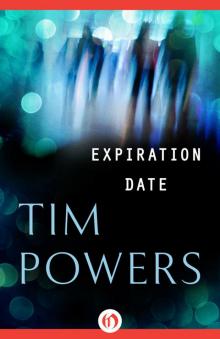 Expiration Date
Expiration Date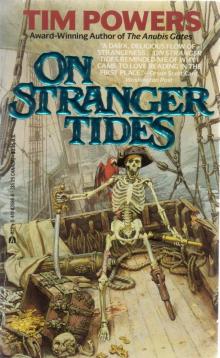 On Stranger Tides
On Stranger Tides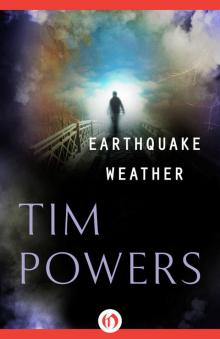 Earthquake Weather
Earthquake Weather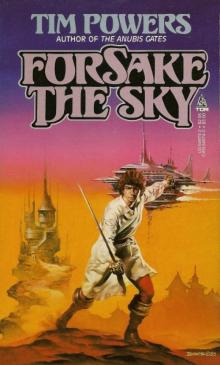 Forsake the Sky
Forsake the Sky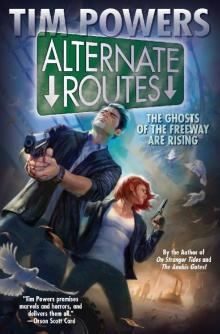 Alternate Routes
Alternate Routes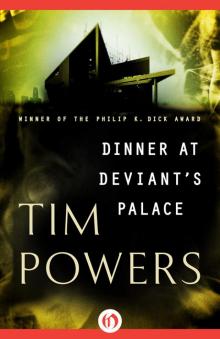 Dinner at Deviant's Palace
Dinner at Deviant's Palace The Stress of Her Regard
The Stress of Her Regard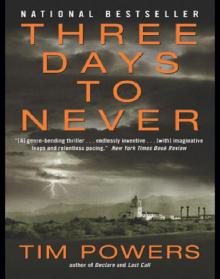 Three Days to Never: A Novel
Three Days to Never: A Novel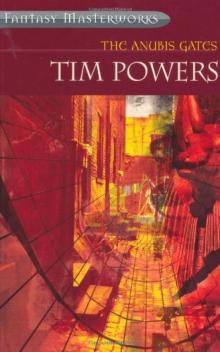 The Anubis Gates
The Anubis Gates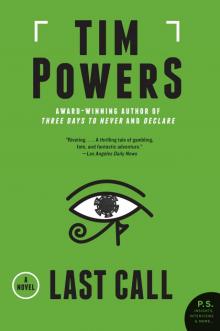 Last Call
Last Call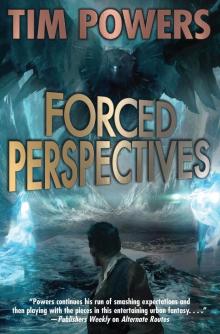 Forced Perspectives
Forced Perspectives Strange Itineraries
Strange Itineraries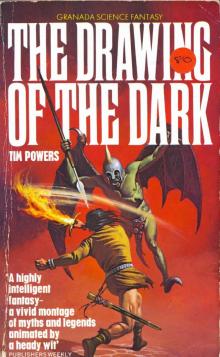 The Drawing of the Dark
The Drawing of the Dark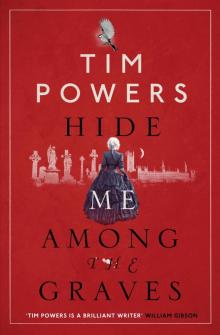 Hide Me Among the Graves
Hide Me Among the Graves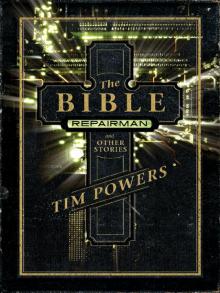 The Bible Repairman and Other Stories
The Bible Repairman and Other Stories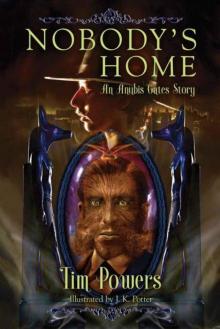 Nobody's Home: An Anubis Gates Story
Nobody's Home: An Anubis Gates Story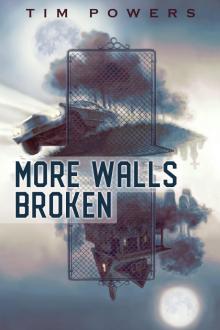 More Walls Broken
More Walls Broken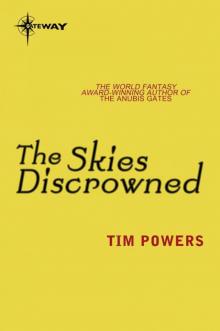 The Skies Discrowned
The Skies Discrowned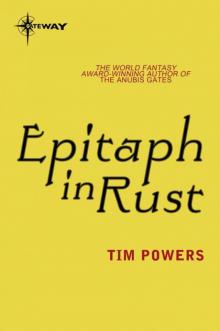 Epitaph in Rust
Epitaph in Rust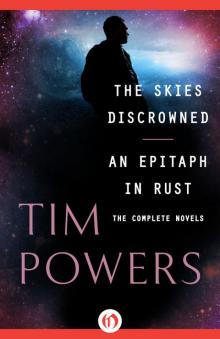 Skies Discrowned and An Epitaph in Rust
Skies Discrowned and An Epitaph in Rust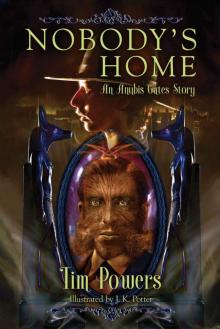 Nobody's Home
Nobody's Home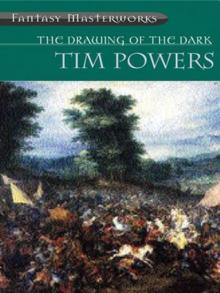 Drawing of the Dark
Drawing of the Dark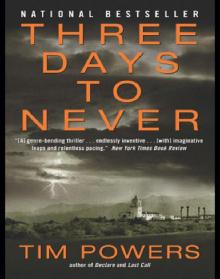 Three Days to Never
Three Days to Never